TeaM Energy aids farmers, agriculture workers through development programs
The agriculture sector is a key component in the development of the Philippines. The growth of this industry directly impacts food security, livelihood, and paves the way for poverty reduction.
About 25% or one fourth of Filipinos are employed in the agriculture sector, which is further divided into four sub-sectors farming, fisheries, livestock, and forestry.
The modernization and development of agriculture has always been a priority of every administration. It has been identified as an area that is integral to the country’s progress.
Recognizing the important role of pushing agriculture development as a means of uplifting the lives of Filipinos, TeaM Energy Corporation, in partnership with stakeholders in government, has pitched in for the sector’s growth by implementing corporate social responsibility (CSR) programs that help push agriculture forward, through TeaM Energy Foundation Inc. (TEFI), its corporate social responsibility arm.
Pressured peso nears 17-year low vs US dollar
P500-B investment prospects to welcome Marcos
Another round of fuel price hikes await motorists on Tuesday
“As the nation’s growth partner, our various programs at TEFI aim to be aligned with the needs of our host communities and the country. Supporting the growth of the agriculture sector is something that aligns with the objectives of government. That’s why in previous years we have allocated time, effort, and resources to programs that impact positively on this sector,” said Maria Teresa C. Lopez, Vice President of TEFI.
Boosting farm output
In Sual, Pangasinan, the livelihood of a community of small rice farmers in Barangay Sioasio was given a boost through TeaM Energy’s construction of a solar-powered rice milling facility, provision of a palay de-husker, winnower, de-stoner, and a sewing machine to make rice sacks.
This has improved rice production and significantly increased the income of the beneficiary farmers while helping contribute to the region’s food security.
The project is in partnership with the Department of Energy (DOE), European Union (EU), the Sual local government, and the Central Pangasinan Electric Cooperative (CENPELCO) to enhance the value of electrification using these productive applications and to sustain the existing solar projects in the area. Additionally, TEFI also installed a solar-powered air-conditioning system for a honey processing plant managed by the Sioasio East Forest Development Association in Sual.
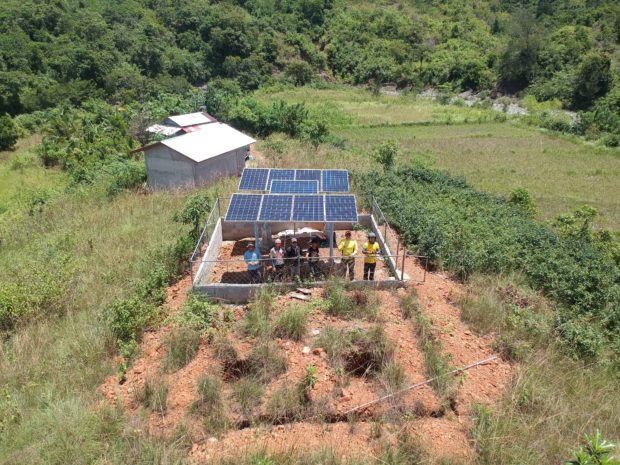
The solar-powered rice milling facility in Sual, Pangasinan operates farming equipment such as a palay de-husker, winnower, de-stoner and a sewing machine for rice sacks using solar energy.
In Quezon province, TeaM Energy constructed a 500 square meter solar slab dryer for rice and corn farmers in Barangay Mayao Silangan, Lucena, Quezon. The concrete slab dryer will benefit small farmers by making possible quicker product turn-around, helping them increase farm productivity and revenues. In Barangay Binahaan, Pagbilao Quezon, an irrigation line canal that will help a community of rice farmers in the area water their crops has also been recently completed early this year by TeaM Energy.
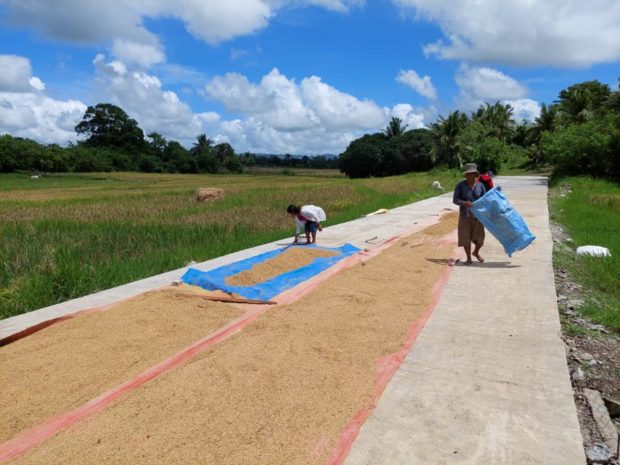
The 500-square meter solar slab dryer constructed for small farmers in Barangay Mayao Silangan, Lucena in Quezon province, will aid them in drying their harvested rice and corn produce.
Even outside of its host communities, the power firm has managed to successfully implement programs to help farmers. Again, in partnership with the DOE, EU, Central Negros Electric Cooperative (CENECO), and the Don Salvador Benedicto local government in Negros Occidental, TeaM Energy provided a 4-kilowatt solar photovoltaic system that powers a decorticating machine to produce high-quality, export-ready pineapple fiber for farmers in the municipality of Don Salvador Benedicto. The machine enables over a hundred pineapple farmers to process pineapple leaves into fiber — creating an added revenue stream from pineapple farming. This productive use of energy is the basis of long-term sustainable economic development to increase the community’s daily income.
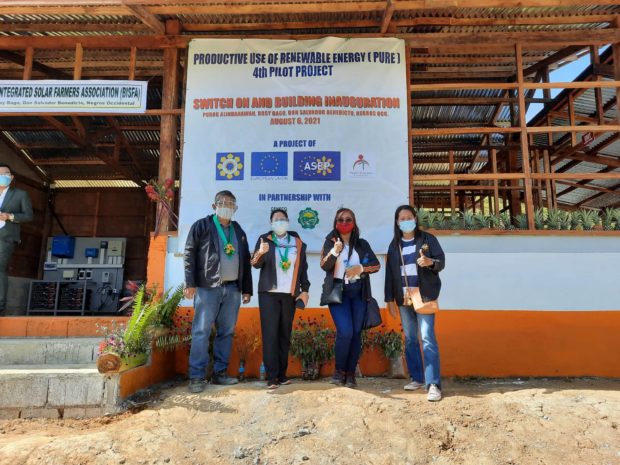
Project PURE’s (Productive Use of Renewable Energy) pilot project in Don Salvador Benedicto, Negros Occidental.
Sustainable livelihood for indigenous people
In General Nakar, Quezon, TeaM Energy has implemented a program that educated and trained members of the indigenous Dumagat tribe to plant, process and market various native products such as guyabano tea, powdered turmeric, lagundi, and honey. The project included the establishment of a livelihood center where members of the community were given the means to study and develop various native products they can sell and market to local and foreign tourists. The center has provided the beneficiaries a venue to display and sell their products—providing Dumagats a sustainable source of livelihood for their families. While the program was completed shortly before the start of the COVID-19 pandemic, community members continue to reap its benefits, at present.
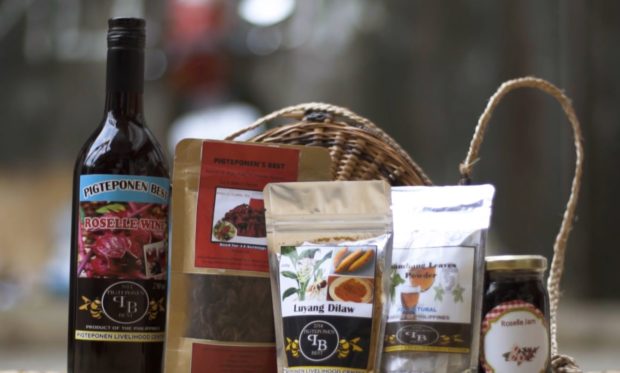
Some of the forest products sold at the Pigteponen Livelihood Center in Gen. Nakar, Quezon by the indigenous Dumagat community.
Fisheries and livestock
To help fisher folk cope with the effects of the pandemic and increase their income by lowering their input costs, TeaM Energy donated fishing nets, materials to build fiberglass fishing boats, and various fishing equipment to members of the Samahan ng Yamang-dagat ng Bantigue (SYDB), a fishermen’s association in Pagbilao, Quezon.
TeaM Energy also donated equipment to help with oyster farming in the area, which is also another good source of livelihood for the residents of the fishing village.
Members of the SYDB also received support for maintaining a brooding pen for female crabs, where newly-hatched crabs are allowed to crawl out of the pen and into the mangrove area and open sea. This is to ensure the sustainability of crabs in the area.
An aqua-culture project in Padre Burgos, Quezon was also established by TeaM Energy for local fisher-folk to augment their income. Grouper (Lapu-lapu) fingerlings and materials for fish pens were provided for the now self-sustaining program.
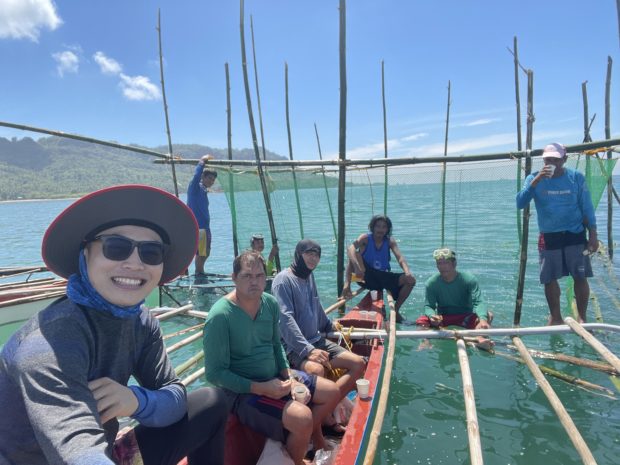
One of the fish cages for Grouper (Lapu-lapu) aqua-culture being set up by TeaM Energy for local fishermen in Padre Burgos, Quezon.
In Quezon, 113 heads of cattle were provided by TeaM Energy to the local government of Pagbilao to augment its animal dispersal program that envisions to help residents have a sustainable income source through livestock breeding and farming.
Improving agriculture for national development
“We realize that the growth of Philippine agriculture is closely tied to the country’s development. TeaM Energy is glad to have been given the opportunity to undertake modest community projects that support the growth of agriculture and ultimately improve lives,” said Froilan Gregory H. Romualdez III, Head of External Affairs, TeaM Energy.
A strong agriculture sector is indeed a cornerstone for growth. Robust production ensures a country’s food security; quality output paves the way for increased jobs through product exports. It will always be government’s priority to move this sector forward. As such, the full support of the private sector will help ensure better results.
TeaM Energy Foundation Inc., is the social development arm of TeaM Energy, which operates two coal-fired power plants: the 1,200 MW Sual Power Station in Pangasinan and the 735 MW Pagbilao Power Station in Quezon province. It also has a 50% stake in the 420 MW Pagbilao Unit 3 Power Project in Quezon.
ADVT
Read more Business stories:
How sellers can earn millions in live selling: Singapore’s Live Show Seller — now in the PH
Lucky BPI AIA policyholders drive home new Honda HR-V
Best gifts to spoil your ‘Super Dads’
Subscribe to our business newsletter
Read Next
Pressured peso nears 17-year low vs US dollar
EDITORS’ PICK
MOST READ
Don’t miss out on the latest news and information. 
View comments

